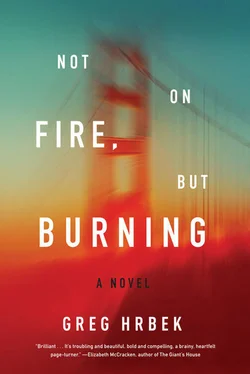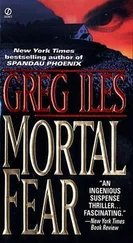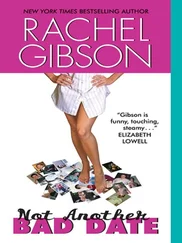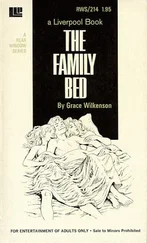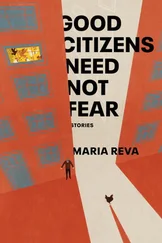“Yo, nitwit.”
“Stop.”
“Time to face your doom,” his brother says. Then informs him that the rents are waiting in the kitchen.
“So you explained it,” Dorian says.
“I told them the party didn’t go so well.”
“That’s it?”
“I told them that, in my expert opinion, you are not to blame, and Mom said, Blame for what exactly.”
“And then what.”
“Then I came in here,” Cliff says. “And BTW. She’s got some serious post — date night stress disorder going on.”

She is waiting in the kitchen, with a terrible hangover and a cup of coffee — for what, she is not sure. For some kind of bad news. In my expert opinion, her older son had said, he isn’t to blame. Blame for what, she said; and he said, He really is the victim here; and she said, Victim of what; and he, gesturing with a forefinger, said, I’ll go get him … So Kathryn is waiting, with a feeling like her brain is trapped under rubble, for the next wave of domestic drama. While she stands by the sink, her husband sits at the table. He looks worse than she feels. He removes his eyeglasses; they dangle from one hand as he stares into the astigmatic distance. Finally saying: “They’re not coming.”
“Mm.”
“They’re tying the sheets together and escaping through the window.”
“Good luck to them.”
He puts the glasses back on and gives her a little smile: “But last night, you did have a good time, right.”
“Heck of a time.”
“It’s just we’re not thirty anymore.”
“We’re not forty either.”
“Well, we aren’t fifty,” he says.
It’s the kind of exchange that can turn, suddenly, stupidly, into an argument. She shrugs assent. Can’t say that, in the literal sense, he isn’t correct. And the truth is, she was having a good time last night. All through the first set (stretched out on the blanket, on the grassy hill above the amphitheatre), Kathryn had felt happy. Happier with every song and every drink of wine and every hit from the oldschool joints that Deven had brought: five of them expertly rolled and neatly lined up in an antique cigarette case. “Where’s it from?” she asked; and he answered, “Humboldt. But don’t worry, this farm took readings and tested the soil for years. It’s way north of the zone.” He started one and handed it to her. A while since she’d smoked anything other than a factory green: just one small hit brought everything around her into a sharper softer focus. The music started; the joint circled back. She felt like something adrift brought to shore on a breaking wave of applause. She lay back on the blanket. Saw one white star: like a faraway idea in the almost-dark sky. Not until intermission, when the music ended, did her mood begin to change … She was lying supine with her eyes closed, people conversing all around her, but their voices were a sound without signification, like wind in a forest. She was thinking of the pot farm in Humboldt — not far (a hundred-something miles north) of the old house in the river valley — and of what their friend had said about its distance from the radiation zone. Which made her think of the city. San Francisco. Most beautiful city in the New World. Place where she and Mitch had started loving each other, and where, also, she had come to know the other. (Don’t think his name; try to snuff it out as you would a flame.) Place also of unplanned pregnancy and of no baby. Whose beauty might have been for all time, but had instead been ruined in an instant, blasted and burned up and poisoned … On the hill above the amphitheatre, she was crying. Hearing the past speaking to her from a great distance. Despite the sounds all around her (the people talking to each other and the crickets calling to one another in the nearby woods), Kathryn Wakefield could hear very clearly a message of confusion, anxiety, and fear: Her own past coming to her across the reaches of space and time. And as she lay there under the stars of the future, a next wave of applause heralding the return of the musicians, she felt she was feeling an impossible sense of interconnection and dependence: as if not just her son’s fantasy of a sister, but even the death of that city where the fantasy had lost her life, had followed somehow from her.

It’s like a movie he saw once, where a prisoner was going to get shot at dawn: His brother escorting him down the carpeted hallway which, through some trick of mental editing, seems longer than it can possibly be. Up ahead, on the right, is the kitchen. Inside, Mitch and Kathryn hear them coming — and they can tell when Dorian stops just shy of the doorway. “Can we get on with it,” Mitch says. Cliff takes his brother by the elbow and steers him across the threshold. At the same moment, they see him; and though each parent is viewing the same damage, only the father makes the correct inference. The mother is thinking: Stupid choice; skateboard; on a dare, maybe .
“Oh, god,” Kathryn says. “Clifford, did you take him to the hospital?”
“Me?” (The thought hadn’t crossed his mind.)
“It’s just a black eye,” Dorian says.
Kathryn (kneeling now): “Something could be broken or fractured.”
“It’s not, Mom.”
“Who did it?” Mitch says.
For a few seconds, Kathryn’s mind, suffering the backlash of last night’s intoxicants, can’t catch up with the question. Then suddenly—
“You got in a fight?”
He looks away.
“You got in a fight at that party.”
“Kate,” Mitch says.
Cliff (raising his hand, but not waiting to be called upon): “Mom, it wasn’t his fault.”
“Did I ask you?”
“Dorian,” Mitch says, “sit down, okay? Kate, please sit down and listen to him. Cliff, just don’t open your mouth.”
“Do I have to be silent in a standing position?”
“Sit.”
He sits. Dorian is already in a chair. Kathryn looks at the three of them, all seated at the table now: a confederacy of males. Standing alone against the sink, she says: “I can listen from here.”
She listened. She listened quietly to my whole story. Standing the whole time on the other side of the room. As if she didn’t want to be near me. I told the truth. That four other kids had been invited. All of them Muslim, though one not Arab. I said that everything had been fine for a while. We were swimming and the girl even wanted a picture with me and Plaxico. But there was this one kid, Omar. Who kept antagonizing me. Which didn’t bother me so much, and I didn’t say a thing back. But when he told the girl to shut up— (“And what was her name?” my father asked. “Who.” “The girl.” “Oh. Khaleela.” “Khaleela,” my brother said. “A lovely name.”) And I continued with the story, explaining how I told Omar to not be rude to her. And how he called me an Aryan. To which I didn’t say a thing. Just walked away. And then there was lunch. (“What’d you have?” my brother asked. “Shwarmas.” “Mm.”) And then after lunch, we all went out to play croquet. And I wasn’t saying anything. I was just playing the game and he started it again. Used that word like it was my name. And the girl (“Khaleela,” my brother interjected) told him to cut it out. And Omar told her to shut up again … My heart was beating fast now, you could hear it in my voice. I’d thought the emotions had died down, but they were still hot. Like with embers; if you blow on them, the fire starts again. (“Go ahead,” my father said.) And I told them that I told Omar that if he spoke to her like that one more time — (I took a breath and let it go) — I would knock the towel off of his head. (“And then,” my mother said, “he hit you.” “No.” “You hit him first?” she said, and my father said, “Will you let him talk, Kate?”) And then I told them that I never did hit him and he never hit me. Omar and his two friends held my arms. The one who threw the punches was Karim.
Читать дальше
